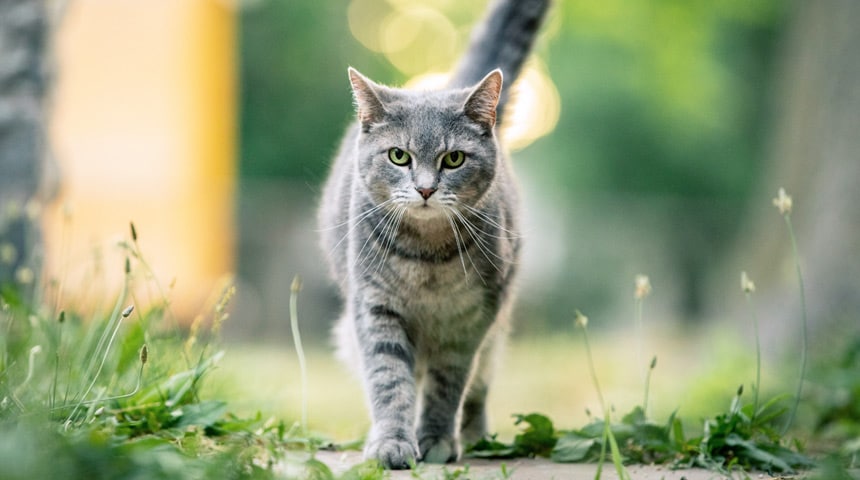
Pet cats that have access to the outdoors are exposed to several elements that can affect their health, yours, or that of wildlife. Here are some possible prevention strategies to reduce the risk of letting your cat roam freely outside:
Regular Veterinary Exams
Cats that have free access to the outdoors are obviously exposed to a greater number of factors that can affect their health. Additionally, it can be difficult to keep track of their diet, stool and urine, or general condition. Schedule regular veterinary checkups to ensure your cat is in good health. This will also be a good time to discuss the aspects below with your veterinary team.
Cars
Cats are exposed to car traffic in your neighbourhood. This constitutes a significant risk and is unfortunately an all too frequent cause of death in our pet cats. Get your cat a brightly coloured collar, preferably with reflective strips. The ideal would be to keep your cat indoors, at least at night.
Cat-napping
A fairly common phenomenon these days is “cat-napping”. Indeed, often very well-meaning people can tame your cat and possibly adopt it. To reduce this risk, provide your cat with a collar and a clearly visible tag that contains your contact details. In addition, the microchip is a very good tool to identify your pet permanently.
Outdoor Temperature
Inevitably, outdoor cats are exposed to the rigours of the Quebec climate. Keep an eye on the weather forecast to prevent your cat from being exposed unnecessarily to the weather. If possible, don't take your cat outside in the winter, as they can suffer from severe frostbite. Same thing for heat stroke when it gets too hot in the summer.
Environment
The city itself can pose a danger to a cat. Indeed, cats are exposed to several risks such as eating toxic plants, getting stuck in a tree, a shed, a fence or other, accidentally falling from a building or a fence, being hit by a car, encountering a loose dog or wild animal, etc. Cats can also get lost. All these risks should be taken into account when deciding to let your cat go outside unsupervised.
Rabies
Although this disease is rare, it poses a very high health risk to most mammals, including humans. This deadly disease spreads through the saliva of infected animals and reaches the brain. There is no way to cure an animal with rabies, so it is very important to prevent this disease through vaccination.
Diseases
Stray cats are very often affected by diseases that can be transmitted between cats. For example, feline infectious rhinotracheitis, feline calicivirosis, panleukopenia and chlamydia are easily transmitted between cats. The most serious are feline leukemia (FeLV), transmitted by saliva, bites or wounds, and feline immunodeficiency virus (FIV). To prevent the risk of transmission, there are vaccines for these diseases. In addition, we recommend screening for FIV and FeLV annually for cats with unsupervised outdoor access.
Other Cats
As discussed above, cats can transmit diseases to each other. They can also fight and hurt each other. Avoid taking your cat outside unsupervised if you already see several cats outside. A good solution would be to walk your cat on a leash. This would avoid several risks associated with neighbourhood cats, while helping to prevent the current overpopulation of stray cats.
Wildlife and Birds
We know that nature and wildlife are fragile. Some animal species are in danger of extinction, even in our Quebec ecosystems. Thus, introducing a skilled hunter such as the cat into a fragile ecosystem could disrupt the survival of certain animal species. Indeed, it has been reported that cats with outdoor access are responsible for the extinction of many species of birds, among others. In addition to hunting for food, many cats kill unnecessarily to bring a "gift" to their owners. In short, reduce your cat's outings in order to preserve the wildlife around you; and provide your cat with a collar visible to birds. Avoid bells on collars, as they could cause long-term hearing damage to your cat.
Parasites
Hunting and carnivorous feeding of cats outdoors exposes them to significant numbers of parasites. In addition, fleas, ticks, mites, and several worms can infect your cat by their mere presence in nature. Make sure to provide your cat with a parasite prevention treatment suited to his lifestyle by consulting your regular veterinarian.
Life Expectancy
It has been estimated that the life expectancy of pets housed inside a home is significantly higher than those with unsupervised outdoor access. To live as long as possible with your companion, offer him the necessary prevention against all the risks listed and keep him indoors as often as possible. There are plenty of ideas to enrich your home and thus offer your cat an equally pleasant environment.

